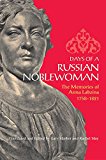
Days of a Russian Noblewoman: The Memories of Anna Labzina, 1758–1821 PDF
202 Pages·2001·9.7208 MB·other
Most books are stored in the elastic cloud where traffic is expensive. For this reason, we have a limit on daily download.
Preview Days of a Russian Noblewoman: The Memories of Anna Labzina, 1758–1821
Description:
Providing a unique glimpse into the domestic life of Russia's nobility in the late eighteenth and early nineteenth centuries, Days of a Russian Noblewoman combines a rare memoir and a diary, now translated into English for the first time. Anna Labzina was relatively well educated by the standards of her day, and she traveled widely through the Russian empire. Yet, unlike most writers of her time, she writes primarily as a dutiful, if inwardly rebellious, daughter and wife, reflecting on the onerous roles assigned to women in a male-centered society. Labzina was married young to Alexander Karamyshev, who, while well regarded in political and scholarly circles of his day, proved to be brutish and abusive at home. A "Russian Voltairian," he professed atheism and free love. His unbridled behavior caused Labzina much grief, which she vividly recalls in her memoir. Because she moved among aristocratic circles, her reminiscences bring readers face to face with celebrated figures of politics and literature, including the Empress Catherine the Great and the "Radiant Prince" Grigorii Potemkin. As a pious and charitable woman, Labzina also speaks for others who rarely had a voice in literature: serfs, prisoners, and political exiles. Labzina wrote both her memoir and her diary during her second marriage, to Alexander Labzin, a leader in Russian Freemasonry and in the movement for religious revival. At the same time, she became actively involved in the spiritual life of his lodge, the Dying Sphinx. Her account of her spiritual development and her social sphere offer unparalleled insights into male and female sensibilities of the time.
See more
The list of books you might like
Most books are stored in the elastic cloud where traffic is expensive. For this reason, we have a limit on daily download.
